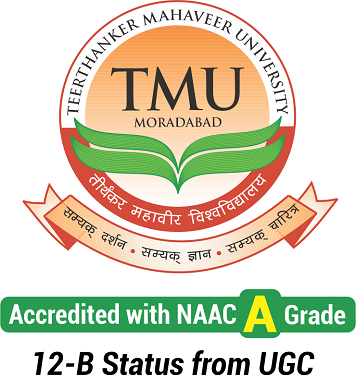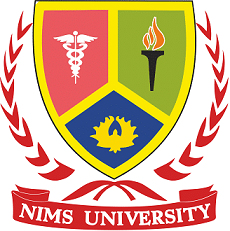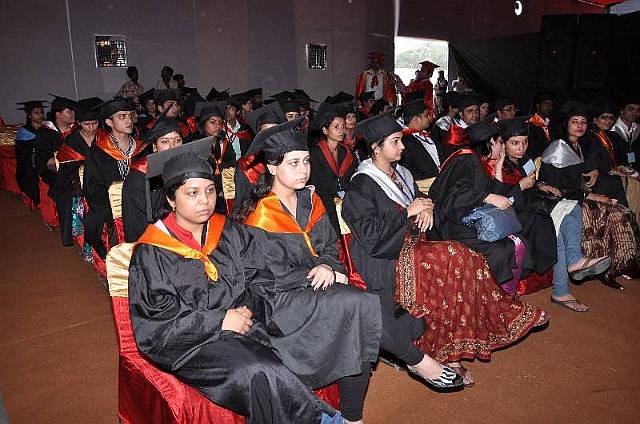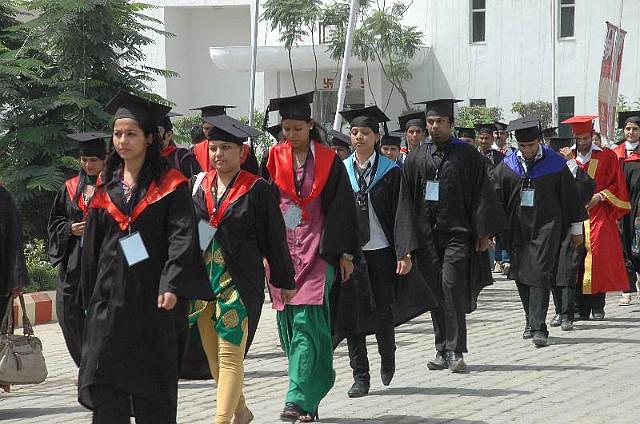![Teerthanker Mahaveer University - [TMU]](https://image-static.collegedunia.com/public/college_data/images/appImage/25977_TMU_APP.jpg?h=240&w=1000&mode=crop)
Bachelor of Science [B.Sc] (Zoology) From TMU, Moradabad
| Years | year 1 | year 2 | year 3 | |||
|---|---|---|---|---|---|---|
| Total Year Wise fees | ₹41,400 | ₹41,400 | ₹41,400 | |||
| Semester | 1 | 2 | 3 | 4 | 5 | 6 |
| Total Fees | ₹20700 | ₹20700 | ₹20700 | ₹20700 | ₹20700 | ₹20700 |
| Tuition fees | ₹16200 | ₹16200 | ₹16200 | ₹16200 | ₹16200 | ₹16200 |
| Exam fees | ₹4500 | ₹4500 | ₹4500 | ₹4500 | ₹4500 | ₹4500 |
TMU Upcoming Application Dates 2024
Expired Events
| Events | Dates |
|---|---|
| Application Deadline (UG, PG & Ph.D Courses) | Aug 15, 2024 |
| CUET UG Result Declaration Date | Jul 20, 2024 |
| CUET UG Exam Date | May 15, 2024 - May 31, 2024 |
Do you think the Dates are wrong ? Report Here

Course Description
Bachelors of Science in Zoology Careers, Salary and Jobs
Bachelors of Science in Zoology is a professional undergraduate degree course in Animal Biology. It is a three-year-course comprising six semesters in most universities. A few universities like IGNOU and Annamalai University (in distance mode) follow annual system wherein exams are held once a year.
Candidates should have passed Class XII with Physics, Chemistry, and Biology and with a minimum aggregate of 50% marks.
One can either enroll in a regular college or opt for Correspondence/Distance Learning. The admission is based on the cut off list issued by the university or college. The admission process is entirely merit-based. The course fee varies from INR 3,000 to INR 7,000 per semester (six months) for different colleges.
| B.Sc Colleges in Tamil Nadu | B.Sc Colleges in Uttar Pradesh | B.Sc Colleges in West Bengal | B.Sc Colleges in Kerala |
The knowledge of Zoology is the central theme in the areas like Environmental Biology and Ecology. There is a lot of scope after graduating in Zoology. A Zoology graduate can get into diverse sectors like animal biodiversity prospecting, Bioinformatics, Ecosystem Monitoring, Wildlife Conservation and Environmental Management.
Highlights of the B.Sc. Zoology Course
| Name of the course | Bachelors of Science in Zoology or B.Sc. Zoology |
|---|---|
| Duration of the course | 3 years |
| Stream | Science |
| Average course fee | INR 5,000 per semester |
| Sectors of employment | Lab, Academic Institutes, Forestry |
| Average entry-level salary | INR 3.5 lakhs per annum |
B.Sc. Zoology Course: What is it About
Zoology, also known as Animal Biology, is the branch of biology that deals with living as well as extinct animals and their interaction with their ecosystems.
The curriculum covers the form, function, and behavior of animals and elucidates general biological principles through the study of specialized or experimentally tractable systems. It is well-structured with theory-based papers along with practical sessions to provide a hands-on experience to the students and help them comprehend scientific concepts easily.
It prepares the students to indulge in the emerging fields of Biology like Animal Biotechnology, Biodiversity Studies, Environmental Management, Ecosystem Monitoring and Animal Bioinformatics, to name a few. Adequate knowledge of Environmental Biology is indispensable in today’s world and thus, has been incorporated into the curriculum. It also focuses on developing students’ practical scientific skills.
It has been well-designed keeping in view the current requirements of B.Sc. (Hons.) Zoology students. The contents have been prepared to familiarize them with the widening horizons of Biological Science. They reflect the changing needs of the students therefore, other important disciplines have been specifically included.
| Animal Physiology | Functional Histology | Environmental Management |
| Molecular Biology | Ecology | Biodiversity: Non-Chordata |
| Biochemistry | Immunology | Biodiversity: Chordata |
| Developmental Biology | Genetics & Genomics | Evolutionary Biology |
| Biotechnology | Bioinformatics | - |
| Applied Zoology | Cell Biology | - |
Who Should Opt for B.Sc. Zoology
Students taking up this course should have a curiosity in animal biology as it deals with the in-depth study of fauna. The study of animals and ecosystem is vast and extensive so, the students having a keen interest in the animal world should opt for the course.
A student must be ready for taking new challenges in the area of research and should be adept at problem-solving. Having some knowledge of interdisciplinary fields like Biotechnology and Biochemistry at a foundational level will be an added advantage.
Duration
Bachelor of Science in Zoology is a three-year-course with a total of six semesters. Examinations are conducted twice a year, one in each semester. During the course of these three years, students have to take about twenty-four papers/exams which would assist them with all necessary educational and professional skills of this field. There is also internals and practical exams conducted by the university.
For open-learning/correspondence mode of education:
Minimum Duration: 3 years
Maximum Duration: 6 years
Eligibility for B.Sc. Zoology
The minimum eligibility criterion for a student to take admission in B.Sc. Zoology is that the candidate must have studied Physics, Chemistry, and Biology in class XII and should have attained a minimum of 50% aggregate in 10+2 examinations.
There is no eligibility percentage for Distance/Correspondence mode of education.
Bachelor of Science [B.Sc.] (Zoology) Admission Process
The admission is based on the cut-off list issued by the university or college. The major admission process is only on the merit basis. A few universities like Banaras Hindu University also conduct their Undergraduate Entrance Tests (UET). Admissions are made according to merit in the entrance test, subject to fulfilling of eligibility requirements.
The process starts in the month of May. The first step is to duly fill the admission form. It can be either online or offline depending on the institution.
The admission to Bachelor of Science in Zoology is based on the marks attained by the students in class XII. Most colleges and universities release cut off lists after the students have filled the admission forms. If the aggregate percentage obtained by the student in the class XII examination satisfies the cut-off criterion issued by the college, he/she shall be granted admission based on the merit list.
Bachelor degree in Zoology can also be awarded through distance education mode. There are a number of colleges and universities in India that offer bona fide education in Zoology through distance or correspondence mode.
The eligibility criterion for admission to B. Sc. Zoology is that the candidate must have studied Physics, Chemistry, and Biology in XII standard. Students need to submit the duly filled application forms to the university. In this mode too. Different universities release cut-off lists for enrollment. Admission is granted to those fulfilling the eligibility criteria. Students must ensure the validity of the course they are pursuing and the college/university in this medium.
Top Institutes Offering B.Sc. Zoology
B.Sc. Zoology is one of the most sought-after courses that Biology students are keen on pursuing. Currently, there are over 500 colleges providing this course. Here is the list of some of the renowned academic institutions offering this course.
| Institute | City |
|---|---|
| Sri Venkateswara College | Delhi |
| Madras Christian College | Chennai |
| St. Joseph’s College | Bengaluru |
| Gargi College | Delhi |
| St. Xavier’s College | Thiruvananthapuram |
| Presidency College | Chennai |
| Maulana Azad College | Kolkata |
| Loyola College | Chennai |
| DAV College | Chandigarh |
| Kirori Mal College | Delhi |
| Presidency College | Chennai |
| Sacred Heart College | Cochin |
| Annamalai University | Tamil Nadu |
| Ramjas College | Delhi |
| St. Joseph’s College | Bengaluru |
| Christ University | Bengaluru |
| Women’s Christian College | Chennai |
| Fergusson College | Pune |
| Miranda House | Delhi |
| Hansraj College | Delhi |
Distance Mode Admission
Bachelor degree in Zoology can also be awarded through distance education mode. There are a number of colleges and universities in India that offer a bona fide course in Zoology through this mode. Students must ensure the validity of the course they are pursuing and the college in distance or correspondence medium.
Here is the list of colleges and universities offering this course in distance mode:
| Open University of Uttaranchal, | Uttarakhand |
|---|---|
| Vardhman Mahaveer Open University, | Kota, Rajasthan |
| Open University of Kota, | Rajasthan |
| Acharya Nagarjuna University | Andhra Pradesh |
| Bharathiar University, Coimbatore | Tamil Nadu |
| Sri Venkateswara University | Tirupati, Tamil Nadu |
| Annamalai University | Tamil Nadu |
| Bhuvaneshwari Correspondence College | Bengaluru, Karnataka |
| Indira Gandhi National Open University | Bengaluru, Karnataka |
| Karnataka State Open University | Karnataka |
| Tamil Nadu Open University | Tamil Nadu |
| Madhya Pradesh Bhoj Open University | Madhya Pradesh |
| Dr.B.R. Ambedkar Open University | Hyderabad, Andhra Pradesh |
| Bharathiar University | Coimbatore, Tamil Nadu |
| Jai Prakash Vidhyalaya | Bihar |
| Nalanda Open University | Patna, Bihar |
| Nethaji Subhas Open university | Kolkata, West Bengal |
| KK Handique State University | Dispur |
| Yashwant Rao Chavan Open University | Nashik, Maharashtra |
| School of Distance Learning and Continuing Education (SDLCE) | Telangana |
Lateral Entry
The universities like Annamalai University offer lateral entry to the students.
Candidates who have passed the first year examinations from a recognized University and where the Syllabi studied are common to the extent of at least 75% with that University, may be admitted to the Second/Third year of the same Degree Program.
Those who have completed the duration of a UG or PG Program and have not been successful in the Examinations, will not be eligible for admission under Lateral Entry Scheme.
| B.Sc Colleges in Maharashtra | B.Sc Colleges in Karnataka | B.Sc Colleges in Andhra Pradesh | B.Sc Colleges in Assam |
Scope for higher studies after B.Sc. in Zoology
After completing their graduate degree in B.Sc. Zoology, candidates have numerous opportunities for their higher studies. Various higher study options after B.Sc. Zoology are listed below:
| Name of the Course | Who should opt for it |
|---|---|
| Master of Science in Zoology, Applied Zoology, Life Science | Those not interested in just basic zoology and want to go for in-depth knowledge. |
| Post Graduate Diploma in Life Science, Applied Zoology | These courses are not only shorter in duration but also more profession-specific. |
| Master of Business Administration in Biotechnology Management, Pharma Management, Dairy Management, Clinical Research, Hospital Administration | Best for the ones wanting to go into management and administration. |
| B.Ed | For those interested in teaching in schools and other academic institutions. |
B.Sc. in Zoology Career Prospects
There are various sectors of employment in the field of Zoology. Here’s the list of job profiles:
| Zoology Faculty Member | Zookeeper | Forensic Experts |
| Clinical Business Associate | Animal rehabilitator | Animal Caretakers |
| Online tutor | Zoo Curator | Wildlife Biologists |
| Research Associate | Documentary Maker | Animal breeders |
| Nutrition Specialist | Researcher | Veterinarian |
| Medical Representative | Animal Behaviorists | Lab Technicians |
| Zoologist | Conservationist | Ecologist |
| Animal and Wildlife Educators | Animal Trainers | Environmental consultant |
| Field trials officer | Biomedical scientist | Toxicologist |
| Marine scientist | Physician associate | Nature conservation officer |
| Environmental education officer | Environmental manager | - |
| Research scientist (life sciences) | Higher education lecturer | - |
There are numerous opportunities after you graduate in Zoology:
- Wildlife Biologist: In the current scenario of global warming, mankind needs to pay attention to conserving the wildlife. Main concern of wildlife biologist are conservation and propagation of wildlife.
- Community development organizations: Ideal places to apply theoretical knowledge in real life settings. You can also join a number of organizations to pursue career in community development like:
- Zoo Outreach Organization
- Dr. Salim Ali School of Ecology
- Indian Tiger Welfare Society
- Wildlife Trust of India
- Bombay Natural History Society (BNHS)
- Protection Society of India
- Ashoka Trust for Research in Ecology and the environment (ATREE) etc.
- Central Zoo Authority (CZA)
- Regional Resource Centers of Ministry of Environment and Forest Wildlife
- Wildlife Information Liaison Development
- Center for Science and Environment (CSE)
- Indian Forest Services (IFoS): A candidate who has graduated and is below 30 years, in case of candidate belonging to the general category can take IFoS exam conducted by Union Public Services Commission (UPSC). The upper age limit is relaxable up to 5 years for the candidates belonging to categories: Scheduled Caste/ Scheduled Tribe (SC /ST).
- Research work: If you are keen in research then you should apply for IISc., IISER, TIFR, NCBS, JNCASR, etc. for an Integrated MSc-PhD program or pursue advanced degree in wildlife biology or ecological sciences from institutes like
- Wildlife Institute of India, Dehradun
- Jawaharlal Nehru University
- The Indian Institute of Ecology and Environment
- The Center for Environmental Education
- Indian Institute of Forest Management
- Wildlife Conservation Society, Bangalore
- Indian institute of Science, Bangalore
- Jawaharlal Nehru Centre for Advanced Scientific Research, Bangalore etc.
- Freelance consultant: You may also work as a freelance consultant in various research and development organizations.
B.Sc in Zoology: Course Structure
The curriculum is well-planned to give theoretical as well as practical knowledge of Zoology and allied courses to the students. There are class tests, practicals, assignments, seminars, projects, and theory lectures.
Syllabus
Zoology is a vast subject that covers the biological aspects of living as well as extinct animals. Students have to take the following courses during B.Sc. program:
| Name of the course | Topics Covered | Description |
|---|---|---|
| Biodiversity: Non-Chordata | Protozoa, Metazoa; Phyla Porifera, Cnidaria, Platyhelminthes, Aschelminthes, Annelida, Arthropoda, Onychophora, Mollusca, Echinodermata | General characters and outline classification of different phyla: Their physiology, structure, distribution, classification, and significance. |
| Biodiversity: Chordata | Protochordates, Agnatha, Pisces, Amphibia, Reptiles, Aves, Mammals | General characters and outline classification: Their physiology, structure, distribution, classification, and significance. |
| Bio-Chemistry | Carbohydrates, Lipids, Proteins, Carbohydrate Metabolism, Lipid Metabolism, Protein Metabolism, Intermediary metabolism, Enzymes, Oxidative Phosphorylation | Includes the knowledge about chemical and physio-chemical processes related to living organisms. |
| Biotechnology | Introduction, Transgenic Animal Technology, Transgenic Plants, Applications of Biotechnology, Molecular Techniques in Gene manipulation, Patenting & Biosafety, Animal Cell and Tissue Culture | This course is designed to understand the biological processes that can be used in industries especially the genetic manipulation of micro-organisms. |
| Ecology | Introduction to Ecology, Ecosystem, Biome, Biosphere and Ecosphere, Population, Population Growth regulation, Ecosystem, Community succession | Understanding relationships among different organisms to one another and to their physical surroundings. |
| Evolutionary Biology | Lamarckism, Darwinism, Neo-Darwinism, Life’s beginning, Evidences of evolution, Process of evolutionary change, Products of evolutionary change Extinction and mass extinction, Origin and evolution of man, Phylogenetic trees | Studies the evolutionary processes that produced the diversity, common descent and speciation on Earth. |
| Genetics | Introduction to Genetics, Mitosis and Meiosis, Sex Determination, Extra-chromosomal Inheritance, Genomic Analysis - Dissection of Gene Function, Population Genetics, Genome Dynamics-Transposable genetic elements, Eukaryotic Viruses, Mendelian Genetics and its Extension, Linkage, Crossing Over and Chromosomal Mapping, Mutations, Developmental Genetics and Model System, Genomics, Quantitative Genetics, Genetic Analysis and Mapping in Bacteria and Bacteriophages, Bioinformatics and Proteomics, Evolutionary Genetics | Comprehend the heredity and the variation of inherited characteristics. |
| Molecular Biology | Nucleic Acids convey Genetic Information, Structures of Genetic Material, Mutability and Repair of DNA, Transcription, RNA Modifications, Translation (Prokaryotes and Eukaryotes), Genome Structure, Chromatin and Nucleosome, Replication of DNA in Prokaryotes and Eukaryotes, Transcription Regulation in Prokaryotes and Eukaryotes, Regulatory RNAs | Knowledge of the structure and function of the macromolecules. |
| Cell Biology | Overview of Cells, Tools and techniques of Cell Biology, Composition of Cells, Nucleus, Protein Sorting and Transport Mitochondria, Chloroplasts and Peroxisomes, Cytoskeleton and Cell Movement, Plasma Membrane, Cell Wall, the Extracellular Matrix and Cell Interactions, Cell Signaling, Cell Cycle, Cell Death and Cell Renewal, Cancer | It covers the different structures and functions of the cell and focuses on the idea of the cell as the basic unit of life. |
| Animal Physiology | Nervous System, Reproductive System, Endocrine System, Tissues and Glands, Digestive System Respiratory System, Excretory System, Circulatory System | The scientific study of physiology of animals. |
| Immunology | Overview of Immune system, Components of immune system, Cells and Organs of the Immune System, Antigens, Immunoglobulins, Major Histocompatibility Complex, Antigen Processing and Presentation, Immune Effectors Mechanisms Hypersensitivity, Immune System in Health & Disease | Deals with various aspects of the immune system in organisms. |
Eligibility Criteria
Aspirants seeking admission to 3 year Full-time Program should be clear 10+2 exam in Science stream with PCB & English from a recognized board
Course Finder
Search from 20K+ Courses and 35+ Streams
Popular Streams:
Compare Popular Colleges With TMU



TMU Latest News
Weightage of Academics and Work Experience in CAT 2024


CAT Logical Reasoning Preparation 2024, Take Blood Relations Quiz


How Much Does an NRI (Non-Residential Indian) Need to Score in JEE Mains to Secure a Seat in NITs

Discover More Colleges


![Teerthanker Mahaveer University, College of Paramedical Sciences - [TMU CPS]](https://image-static.collegedunia.com/public/college_data/images/appImage/1497260208paracover.jpg?h=111.44&w=263&mode=crop)



![Sanjay Gandhi Postgraduate Institute of Medical Sciences - [SGPGIMS]](https://image-static.collegedunia.com/public/college_data/images/appImage/10944_SGPGIMS_NEW.jpg?h=111.44&w=263&mode=crop)

![King George's Medical University - [KGMU]](https://image-static.collegedunia.com/public/college_data/images/appImage/1498220102cvr.png?h=111.44&w=263&mode=crop)


![Teerthanker Mahaveer University - [TMU]](https://image-static.collegedunia.com/public/college_data/images/logos/1708058956TMUNEWVERSIONLOGO.png?h=71.17&w=71.17&mode=crop)

![Teerthanker Mahaveer University, College of Architecture - [TMU COA]](https://image-static.collegedunia.com/public/college_data/images/appImage/1497265872archcover.jpg?h=111.44&w=263&mode=crop)













![Teerthanker Mahaveer University, College of Architecture - [TMU COA]](https://image-static.collegedunia.com/public/college_data/images/logos/16037025021475566762Untitled.jpg?h=72&w=72&mode=crop)
![Teerthanker Mahaveer Dental College and Research Centre - [TMDCRC]](https://image-static.collegedunia.com/public/college_data/images/logos/1475562519Untitled.png?h=72&w=72&mode=crop)
![Teerthanker Mahaveer College of Law & Legal Studies - [TMCLLS]](https://image-static.collegedunia.com/public/college_data/images/logos/1475324277Untitled.png?h=72&w=72&mode=crop)
![Teerthanker Mahaveer University, College of Pharmacy - [TMU COP]](https://image-static.collegedunia.com/public/college_data/images/logos/1475566762Untitled.png?h=72&w=72&mode=crop)
![Teerthanker Mahaveer University, College of Engineering - [TMU COE]](https://image-static.collegedunia.com/public/college_data/images/logos/1475489168Untitled.png?h=72&w=72&mode=crop)

![Teerthanker Mahaveer College of Computing Sciences and Information Technology - [TMCCSIT]](https://image-static.collegedunia.com/public/college_data/images/logos/1475474705Untitled.png?h=72&w=72&mode=crop)
![Teerthanker Mahaveer Institute of Management and Technology - [TMIMT]](https://image-static.collegedunia.com/public/college_data/images/logos/1475480158Untitled.png?h=72&w=72&mode=crop)
![Teerthanker Mahaveer University, College of Paramedical Sciences - [TMU CPS]](https://image-static.collegedunia.com/public/college_data/images/logos/1475486387Untitled.png?h=72&w=72&mode=crop)
![Teerthanker Mahaveer University, College Of Nursing - [TMU CON]](https://image-static.collegedunia.com/public/college_data/images/logos/1497418040nursinglogo.png?h=72&w=72&mode=crop)




![Swami Vivekanand Subharti University - [SVSU]](https://image-static.collegedunia.com/public/college_data/images/logos/14989069741472103100Untitled.png?h=72&w=72&mode=crop)
![IIMT University - [IIMTU]](https://image-static.collegedunia.com/public/college_data/images/logos/1619508769logo4.png?h=72&w=72&mode=crop)
![Galgotias University - [GU]](https://image-static.collegedunia.com/public/college_data/images/logos/1593772670logo.jpg?h=72&w=72&mode=crop)
![Sanskriti University - [SU]](https://image-static.collegedunia.com/public/college_data/images/logos/14987369191475559982finallo.jpg?h=72&w=72&mode=crop)


![Moradabad Institute of Technology - [MIT]](https://image-static.collegedunia.com/public/college_data/images/logos/1652246998LOGO.jpg?h=72&w=72&mode=crop)
![Directorate of Distance Education Teerthanker Mahaveer University - [DDE-TMU]](https://image-static.collegedunia.com/public/college_data/images/logos/1497850178logo.jpg?h=72&w=72&mode=crop)


![Mangalayatan University - [MU]](https://image-static.collegedunia.com/public/college_data/images/logos/1498651914mangalyatanlogov4.png?h=72&w=72&mode=crop)





Comments